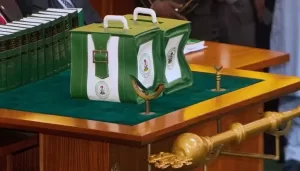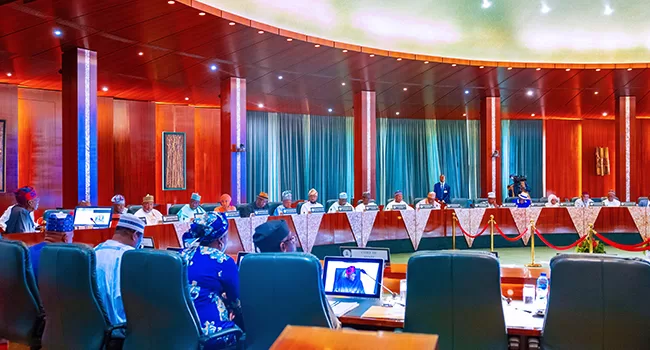The Federal Executive Council (FEC) has approved a proposed budget of N47.9 trillion for the 2025 fiscal year, marking a significant 35 percent increase from the N35.5 trillion approved for 2024.
The decision was made during a meeting presided over by President Bola Tinubu at the State House in Abuja on Thursday.
Atiku Bagudu, the Minister of Budget and Economic Planning, briefed journalists after the meeting, explaining that the approval was part of the Medium Term Expenditure Framework (MTEF) for 2025 to 2027, in line with the Fiscal Responsibility Act (FRA) of 2007.
Bagudu said that the government would work to ensure the 2025 budget is passed by the National Assembly and signed into law by the president before the end of December.
Bagudu also outlined key assumptions underpinning the budget. The price of crude oil has been pegged at $75 per barrel, with oil production projected at 2.06 million barrels per day and an exchange rate set at N1,400 to the dollar. The budget is based on an expected GDP growth rate of 4.6 percent for 2025.
“The federal government budget estimate as the aggregate expenditure is estimated at N47 trillion, and this includes a borrowing of 13.8 trillion, which is 3.87 percent of estimated and it includes projections, especially for the first time, provisions of contribution to the development commissions that have been passed by the National Assembly,” Bagudu stated.
He added that FEC also approved the 2025-2027 MTEF and Fiscal Strategy Papers (FSP) and emphasized that the federal government is working to ensure a January-December budget cycle.
The 2025 budget is designed to address the country’s economic challenges and promote growth, with a focus on fiscal discipline and revenue generation.
READ ALSO: Delta Approves N936 Billion Budget Proposal for 2025 Fiscal Year
The budget includes N9.92 trillion for non-debt recurrent expenditure, N7.72 trillion for capital expenditure (exclusive of transfers), N8.25 trillion for debt servicing, N1.37 trillion for statutory transfers, and a sinking fund of N243.66 billion.
Bagudu also reviewed the implementation of the 2024 budget, noting promising progress in revenue collection and expenditure management. He stated that despite some delays in reaching projected targets, key non-oil revenue streams were performing better than expected.

“Despite lags in projected targets, the overall trajectory shows that fiscal efforts are on track, and these key non-oil streams are performing better than anticipated,” Bagudu said. He emphasized that the Nigerian economy had made significant strides, achieving positive growth and economic stability.
The FEC meeting also saw approval for the establishment of a Ministry of Finance Incorporated Real Estate Investment Fund, with an initial capital of N250 billion. This fund aims to provide low-cost, long-term mortgages to Nigerians seeking to acquire homes.
Wale Edun, the Minister of Finance and Coordinating Minister of the Economy, said the fund would address the country’s housing deficit, which stands at 22 million units, while also stimulating job creation and economic growth.
Edun explained that the fund would help revive long-term mortgage financing in Nigeria.
“Long term investors have the opportunity to earn market rates of interest on investment and market returns, market price-based rates of return on investment,” Edun said.
He added that the government’s blending of long-term savings from institutions like pension funds with low-cost funding could make mortgages more affordable, with interest rates likely to be in the low double digits, depending on market conditions.
“When I say low cost, we are talking about low double digit, maybe 11, 12 percent, maybe even less, depending on market conditions,” he said.
In addition, the FEC approved a fresh external borrowing plan of $2.2 billion, consisting of $1.7 billion in Eurobond issuance and $500 million in Sukuk financing.
Edun stated that this borrowing would help strengthen Nigeria’s finances and support ongoing economic reforms.
The approval is expected to grant Nigeria access to the international capital markets for both Eurobond and Sukuk financing, which will be finalized once the National Assembly considers the proposal.
“This is a sign of the acceptance and support for the macroeconomic programmes of Mr. President and his administration,” Edun noted, emphasizing that Nigeria’s ability to access the international capital market demonstrates confidence in the country’s economic recovery efforts.
He further pointed out that Nigeria’s resilience in the financial market, demonstrated by successful domestic dollar bond issuances, had attracted significant investment from Nigerian investors.
The approval of the N47.9 trillion budget and additional measures such as the real estate investment fund and external borrowing plans reflect the government’s strategy to boost economic growth, address critical infrastructure deficits, and improve the lives of Nigerians.

